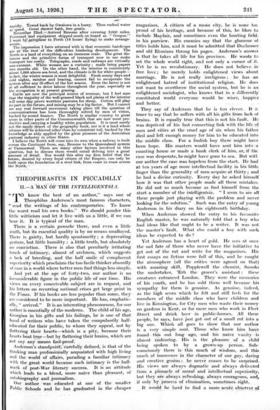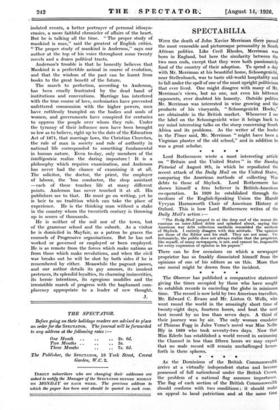THEOPHRASTUS IN PICCADILLY
IL—A MAN OF THE INTELLIGENTSIA.
" MO know the best of an author," says one of Theophilus Anderson's most famous characters, " read the writings of his _contemporaries. To know the worst read his own books." -We should ponder this little witticism and let it live with us,a little, if we can bear it. It is typical of the man. - - There is a certain panache there, and even a little truth, but its essential quality is by no means. unalloyed. There is gaiety, but hardly spontaneity ; a deprecating gesture, but little humility ; a little truth, but absolutely no conviction. There is also that peculiarly irritating touch of -intimacy, almost of archness, which suggests a lack of breeding, and the half smile of complacent superiority which proclaims the too facile thinker absurdly et ease in a world where better men find things less simple.
• And yet at the age of forty-two, our author. is no inconsiderable figure in the public life of our time. His views on every conceivable subject are in request, and his letters -on recurring national crises get large print in the Times. If his books are less popular than some, they are considered to be more important. He has, emphatic- ally, " arrived:" It is an interesting phenomenon, for our Author is essentially of the moderns. The child of his age, Georgian in his gifts and his failings, he is one of that band. of writers who have taken the compulsorily half- educated for their public, to whom they appeal, not by fluttering their hearts—which is a pity, because their hearts beat true—but by flattering their brains, which are not any any means Awl-proof. _- Anderson's standpoint; carefully defined, is that of the thinking man professidnally aequainted with high living and the world of affairs, parading a familiar intimacy with the great world because such intimacy is the hall- mark of post-War literary success. It is an attitude which leads to a blend, more naive than pleasant, of autobiography and ,journalism.
Our author was educated at one of the smaller Public Schools and he has graduated in the cheaper magazines. A citizen of a mean city, he is none toe proud of his heritage, and because of this, he likes to. include Mayfair, and sometimes even the hunting. field,' in his purview. His enemies say , that the glamour of- - titles holds him, and it must be admitted that Duchesses- and old Etonians throng his pages. Anderson's answer. is that he takes all life for his province. • He wants to.: set the whole world right, and not only a corner of it, Yet he is no revolutionary. He does not believe.• in- free love ; he merely holds enlightened views about. marriage. He is not really irreligious ; he has -an enlightened hatred of institutional religion. He does. not want to overthrow the social system, but he is an enlightened sociologist, who knows that in a. differently constituted world everyone would be wiser, happier- and better. - • They say of Anderson that he is :too clever.. It- is truer to say that he suffers with all his gifts from lack of- brains. It is equally true that this is not his fault. He was deprived' of his last connecting link with the life of men and cities at the 'cruel age of six when his father died and left enough money for him to be educated- into the- middle class. For a foolish boy there might have been hope. His. masters would have sent him into 'a counting house or made a bank clerk of . him, or, if, the case was desperate, he might have gone to sea. But with our.author the, case. wag hopeless from the start. He had at ten years of age more intellectual facility in his little finger than the generality of men acquire at thirty.; and he had a divine curiosity. Every day he asked himself how it was that other people made all these mistakes. He did not so much .become as find himself from the start a member of the intelligentsia. " I seem to Sec all these people just playing with the problem and never looking for .the solution." Such was the entry .of. young Anderson in his diary on his eighteenth birthday. . .
When Anderson showed the 'entry to his favourite English master, he was naturally told that a boy who had ideas like that ought to be a writer. It was not the master's fault. What else could a boy with such ideas be expected to do ? .
Yet Anderson has a heart of gold. He sees at once the sad fate of those who never have the initiative to get out of the rut and write for the magazines. His first essays on fiction were full of this, and be caught the atmosphere (all the critics were agreed on that) with amazing skill. Popplewell the chemiSt, Snooks the undertaker, 'Erb the grocer's assistant : these creatures entranced London. They were the memories of his youth, and he has sold them well because his sympathy for them is genuine. As genuine, indeed, as the high scorn which he felt and still feels for the members of the middle class who have children and live in Kensington, for City men who waste their money on gardens in Kent, or for mere men who work in Fleet Street and drink. beer in public-houses. All these people, he says, have just got out of a small rut into .a big one. Which all goes to show that our author is a very simple soul. Those who know him .1fave found. - this -out long -ago., -and -his -naive vanity , is iilMoSt endearing.. His is the. pleasure, of a child being spoken to by a grown-up person. Sub- consdously there this much of wisdom, and this much of innocence in the character of our gay, daring and creative .genins_;. never ceases to be surprised. His views are always dogmatic and always delivered from a. pinnacle of moral and intellectual superiority, but they are always refreshing, always courageous, and, if only ,by .Process of elimination, sometimes . right, It would be hard to find a more acute observer of isolated events, a better portrayer of personal idiosyn- crasies, a more faithful chronicler of affairs of the heart. But he is talking all the time. " The proper study of mankind is man,?' said the greatest of English critics. " The proper study of mankind is Anderson," says our author at the top of his voice throughout some twenty novels and a dozen political tracts.
Anderson's trouble is that he honestly believes that Mankind is a perfectible animal in course of evolution, and that the wisdom of the past can be learnt from books to the great benefit of the future.
The march to perfection, according to Anderson, has been cruelly frustrated by the dead hand of institutions and conventions. Marriage has interfered with the true course of love,- ecclesiastics have prevented unfettered communion with the higher powers, men have ruthlessly trampled on the bodies" and souls of women, and governments have conspired for centuries to oppress the people over whom they rule. Under the tyranny of their influence men have been brought so low as to believe, right up to the date of the Education Act of 1871, that marriage laws, the Christian Churches, the rule of man in society and rule of authority in national life corresponded to something fundamental in human nature. Even to-day, only members of the intelligentsia realize the daring imposture ! It is a philosophy which requires examination, and Anderson has never had the chance of examining it at all. The solicitor, the doctor, the priest, the employer of labour, the 'bus conductor, the shop assistant —each of these touches life at many different points. Anderson has never touched it at all. His publishers see to that. He must go on writing, yet he is heir to no tradition which can take the place of experience. He is the thinking man without a stake in the country whom the twentieth century is throwing up in scores of thousands.
He is neither, of the soil nor of the town, but of the grammar school and the suburb. As a visitor he is domiciled in Mayfair, as a patron he graces the counsels of Progressive organizations. But he has not worked or governed or employed or been employed. He is as remote from the forces which make nations as from those which make revolutions, and when the civil war breaks out he will be shot by both sides if he is remembered by either. Meanwhile the pageant passes, and our author details its gay amours, its insolent pretences, its splendid loyalties, its charming insincerities, its heroic intentions, its egregious muddles and the irresistible march of progress with the haphazard com- placency appropriate to a leader of new thought.
J.



































 Previous page
Previous page